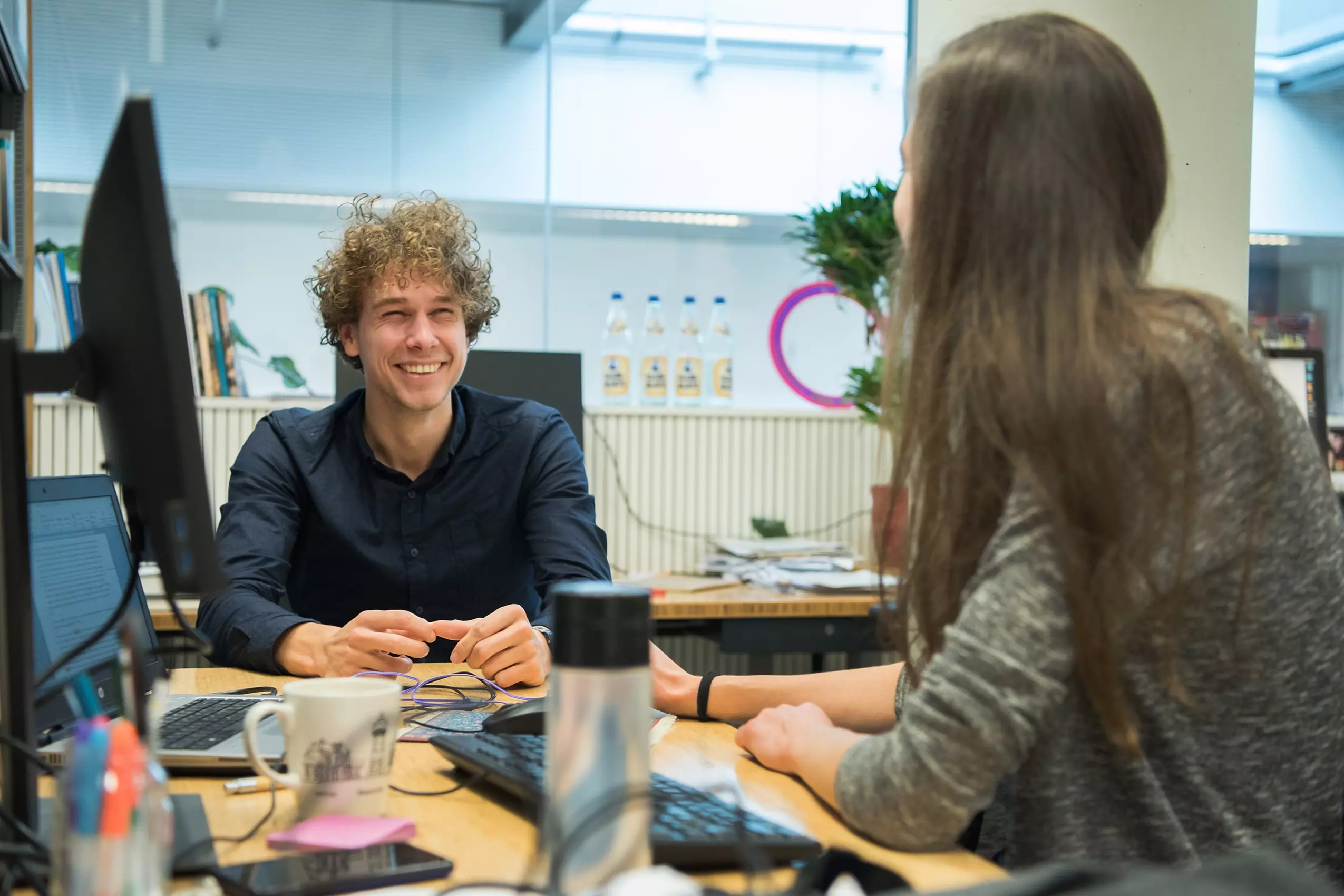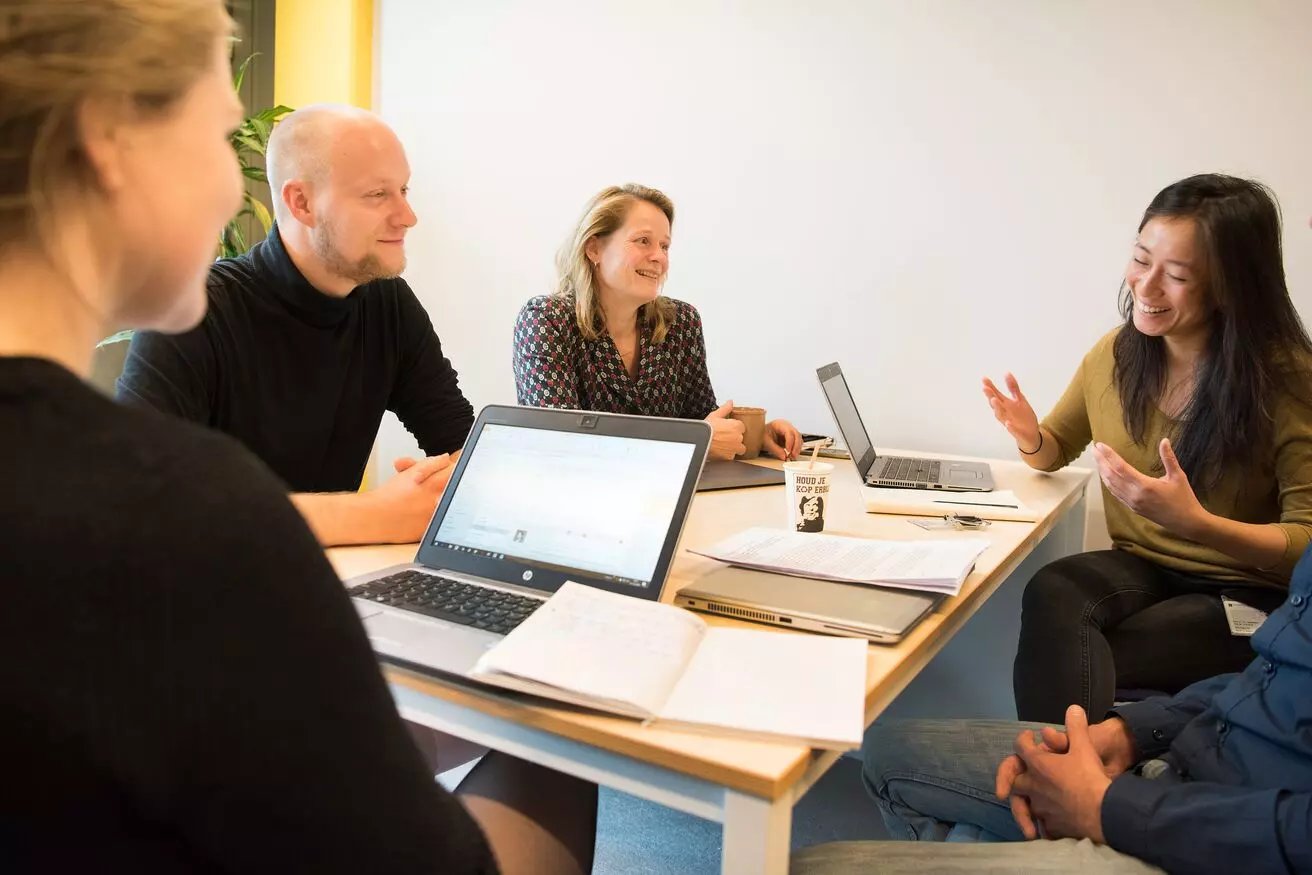.jpg)
The Institute for Logic, Language and Computation (ILLC) at the University of Amsterdam is inviting applications for a fully funded PhD position in the NWO VIDI project "Improving Social Media Using Large Language Models."
PhD Position on Improving Social Media Using Large Language Models
- Faculty of Science
- 14252
- Master's
- €3.059 - €3.881
- 38 hours
- Closes on06-09-2025

The Institute for Logic, Language and Computation (ILLC) at the University of Amsterdam is inviting applications for a fully funded PhD position in the NWO VIDI project "Improving Social Media Using Large Language Models."
PhD Position on Improving Social Media Using Large Language Models
- Faculty of Science
- 14252
- Master's
- €3.059 - €3.881
- 38 hours
- Closes on06-09-2025
Working at the UvA
Join our research team!
We are looking for a highly motivated candidate with a strong background in computer science or a related field (e.g., artificial intelligence, computational linguistics, or data science). The ideal candidate has an interest in working at the intersection of large language models (LLMs), social media, and politics, and is eager to contribute to cutting-edge research with both theoretical and applied components.

Working at the UvA
Join our research team!
We are looking for a highly motivated candidate with a strong background in computer science or a related field (e.g., artificial intelligence, computational linguistics, or data science). The ideal candidate has an interest in working at the intersection of large language models (LLMs), social media, and politics, and is eager to contribute to cutting-edge research with both theoretical and applied components.
All about this vacancy
What are you going to do?
Social media platforms play a central role in shaping political discourse, yet they also facilitate misinformation, polarization, radicalization, and manipulation. Recent advances in LLMs offer new tools for understanding and potentially improving these platforms. This project explores how LLMs can be used to analyze, simulate, critique, and even intervene in online political communication—focusing on both the risks and the opportunities these technologies present.
The PhD candidate will have substantial freedom to shape their own project within this broader research theme, supported by the PI and the collaborative environment of the ILLC.
Your profile
MSc degree (or equivalent) in computer science or a closely related field
Strong programming skills and experience with machine learning, especially natural language processing
Familiarity with and interest in political communication, social media analysis, and computational social science
Excellent written and spoken English
Ability to work independently and collaboratively
Please note that knowledge of the Dutch language is not required for these positions. However, PhD candidates at the ILLC have the opportunity to attend Dutch language classes if they wish.
Our offer
A temporary contract for 38 hours per week for the duration of 4 years (the initial contract will be for a period of 18 months and after satisfactory evaluation it will be extended for a total duration of 4 years). The preferred starting date is is flexible but should be before January 2026. This should lead to a dissertation (PhD thesis). We will draft an educational plan that includes attendance of courses and (international) meetings. We also expect you to assist in teaching undergraduates and master students.
The gross monthly salary, based on 38 hours per week and dependent on relevant experience, ranges between € 3,059 to € 3,881 (scale P). This does not include 8% holiday allowance and 8,3% year-end allowance. The UFO profile PhD Candidate is applicable. A favourable tax agreement, the ‘30% ruling’, may apply to non-Dutch applicants. The Collective Labour Agreement of Universities of the Netherlands is applicable.
Besides the salary and a vibrant and challenging environment at Science Park we offer you multiple fringe benefits:
232 holiday hours per year (based on fulltime) and extra holidays between Christmas and 1 January;
multiple courses to follow from our Teaching and Learning Centre;
a complete educational program for PhD students;
multiple courses on topics such as time management, handling stress and an online learning platform with 100+ different courses;
7 weeks birth leave (partner leave) with 100% salary;
partly paid parental leave;
a pension at ABP for which UvA pays two third part of the contribution;
the possibility to follow courses to learn Dutch;
help with housing for a studio or small apartment when you’re moving from abroad.
In addition,
A stimulating interdisciplinary environment with access to experts in AI, language, and the social sciences
Opportunities to present at top conferences and publish in high-impact venues
A vibrant and international research community in the heart of Amsterdam
Are you curious to read more about our extensive package of secondary employment benefits, take a look here.
All about this vacancy
What are you going to do?
Social media platforms play a central role in shaping political discourse, yet they also facilitate misinformation, polarization, radicalization, and manipulation. Recent advances in LLMs offer new tools for understanding and potentially improving these platforms. This project explores how LLMs can be used to analyze, simulate, critique, and even intervene in online political communication—focusing on both the risks and the opportunities these technologies present.
The PhD candidate will have substantial freedom to shape their own project within this broader research theme, supported by the PI and the collaborative environment of the ILLC.
Your profile
MSc degree (or equivalent) in computer science or a closely related field
Strong programming skills and experience with machine learning, especially natural language processing
Familiarity with and interest in political communication, social media analysis, and computational social science
Excellent written and spoken English
Ability to work independently and collaboratively
Please note that knowledge of the Dutch language is not required for these positions. However, PhD candidates at the ILLC have the opportunity to attend Dutch language classes if they wish.
Our offer
A temporary contract for 38 hours per week for the duration of 4 years (the initial contract will be for a period of 18 months and after satisfactory evaluation it will be extended for a total duration of 4 years). The preferred starting date is is flexible but should be before January 2026. This should lead to a dissertation (PhD thesis). We will draft an educational plan that includes attendance of courses and (international) meetings. We also expect you to assist in teaching undergraduates and master students.
The gross monthly salary, based on 38 hours per week and dependent on relevant experience, ranges between € 3,059 to € 3,881 (scale P). This does not include 8% holiday allowance and 8,3% year-end allowance. The UFO profile PhD Candidate is applicable. A favourable tax agreement, the ‘30% ruling’, may apply to non-Dutch applicants. The Collective Labour Agreement of Universities of the Netherlands is applicable.
Besides the salary and a vibrant and challenging environment at Science Park we offer you multiple fringe benefits:
232 holiday hours per year (based on fulltime) and extra holidays between Christmas and 1 January;
multiple courses to follow from our Teaching and Learning Centre;
a complete educational program for PhD students;
multiple courses on topics such as time management, handling stress and an online learning platform with 100+ different courses;
7 weeks birth leave (partner leave) with 100% salary;
partly paid parental leave;
a pension at ABP for which UvA pays two third part of the contribution;
the possibility to follow courses to learn Dutch;
help with housing for a studio or small apartment when you’re moving from abroad.
In addition,
A stimulating interdisciplinary environment with access to experts in AI, language, and the social sciences
Opportunities to present at top conferences and publish in high-impact venues
A vibrant and international research community in the heart of Amsterdam
Are you curious to read more about our extensive package of secondary employment benefits, take a look here.
Your place at the UvA
Where you will work
The University of Amsterdam is the Netherlands' largest university, offering the widest range of academic programmes. At the UvA, 30,000 students, 6,000 staff members and 3,000 PhD candidates study and work in a diverse range of fields, connected by a culture of curiosity.
The Faculty of Science has a student body of around 8,000, as well as 1,800 members of staff working in education, research or support services. Researchers and students at the Faculty of Science are fascinated by every aspect of how the world works, be it elementary particles, the birth of the universe or the functioning of the brain.
The Institute for Logic, Language and Computation is home to a thriving community of scholars, including philosophers, logicians, mathematicians, computer scientists, linguists, musicologists, and cognitive scientists, who share a fascination with the interdisciplinary study of information. At the ILLC we combine the problem solving skills from the sciences with the holistic and reflective view of the humanities to discover the principles that regulate information processing and find answers to some of the hardest challenges of our time.
More about the UvA
The University of Amsterdam is ambitious, creative and committed. An inspiration to students since 1632, a vanguard player in international science and a partner in innovation.
The University of Amsterdam is the largest university in the Netherlands, with the broadest range of courses on offer. An intellectual hub with 42,000 students, 6,000 staff and 3,000 PhD students. Connected by a culture of curiosity.
Your place at the UvA
This is where you will be working
Where you will work
The University of Amsterdam is the Netherlands' largest university, offering the widest range of academic programmes. At the UvA, 30,000 students, 6,000 staff members and 3,000 PhD candidates study and work in a diverse range of fields, connected by a culture of curiosity.
The Faculty of Science has a student body of around 8,000, as well as 1,800 members of staff working in education, research or support services. Researchers and students at the Faculty of Science are fascinated by every aspect of how the world works, be it elementary particles, the birth of the universe or the functioning of the brain.
The Institute for Logic, Language and Computation is home to a thriving community of scholars, including philosophers, logicians, mathematicians, computer scientists, linguists, musicologists, and cognitive scientists, who share a fascination with the interdisciplinary study of information. At the ILLC we combine the problem solving skills from the sciences with the holistic and reflective view of the humanities to discover the principles that regulate information processing and find answers to some of the hardest challenges of our time.
More about the UvA
The University of Amsterdam is ambitious, creative and committed. An inspiration to students since 1632, a vanguard player in international science and a partner in innovation.
The University of Amsterdam is the largest university in the Netherlands, with the broadest range of courses on offer. An intellectual hub with 42,000 students, 6,000 staff and 3,000 PhD students. Connected by a culture of curiosity.
Important to know
Your application & contact
If you feel the profile fits you, and you are interested in the job, we look forward to receiving your application. You can apply online via the button below. We accept applications until and including 06 September 2025.
Applications should include the following information (all files besides your cv should be submitted in one single pdf file):
CV (max 2 pages)
Motivation letter (max 1 page)
An one-page research proposal outlining a possible focus for your PhD project within the theme. It does not need to be fully developed but should demonstrate your ability to formulate an interesting and feasible research direction, including, for instance, clear research question or set of questions, a theoretical background and expectations, and a research strategy.
Academic transcripts.
Names and contact information of two academic referees
A knowledge security check can be part of the selection procedure (for details: national knowledge security guidelines). Only complete applications received within the response period via the link below will be considered. The interviews will be held in the course of September 2026.
Do you have any questions or do you require additional information? Please contact:
dr. Petter Törnberg ([email protected])
Diversity, Equity & Inclusion
As an employer, the UvA maintains an equal opportunities policy. We value diversity and are fully committed to being a place where everyone feels at home. We nurture inquisitive minds and perseverance and allow room for persistent questioning. With us, curiosity and creativity are the prevailing culture.
Important to know
Your application & contact
If you feel the profile fits you, and you are interested in the job, we look forward to receiving your application. You can apply online via the button below. We accept applications until and including 06 September 2025.
Applications should include the following information (all files besides your cv should be submitted in one single pdf file):
CV (max 2 pages)
Motivation letter (max 1 page)
An one-page research proposal outlining a possible focus for your PhD project within the theme. It does not need to be fully developed but should demonstrate your ability to formulate an interesting and feasible research direction, including, for instance, clear research question or set of questions, a theoretical background and expectations, and a research strategy.
Academic transcripts.
Names and contact information of two academic referees
A knowledge security check can be part of the selection procedure (for details: national knowledge security guidelines). Only complete applications received within the response period via the link below will be considered. The interviews will be held in the course of September 2026.
Do you have any questions or do you require additional information? Please contact:
dr. Petter Törnberg ([email protected])
As an employer, the UvA maintains an equal opportunities policy. We value diversity and are fully committed to being a place where everyone feels at home. We nurture inquisitive minds and perseverance and allow room for persistent questioning. With us, curiosity and creativity are the prevailing culture.
Other interesting vacancies for you

PhD Position on Shape Analysis for Medical Imaging
- Faculty of Science
- €3.059 - €3.881
- Closes on31-08-2025
- Master's
- 38 hours
Do you want to help us make AI more efficient for medicine? If the answer is yes, please continue reading!
View vacancy
.jpg)
PhD Candidate in Neuronal Imaging, Optogenetics and Perception
- Faculty of Science
- €2.901 - €3.707
- Closes on07-09-2025
- Master's
- 38 hours
Join Us in unravelling the brain mechanisms of visual perception!
View vacancy

PhD Position in Atom Interferometry
- Faculty of Science
- €3.059 - €3.881
- Closes on31-08-2025
- Master's
- 38 hours
Are you eager to push optical atomic clocks to new levels in a lively, international research group? Do you enjoy creating complex machines that have never existed before? Do you want to explore physics that nobody else has seen? Maybe you want to join our team as a PhD on our journey to continuous cold and ultracold atom interferometry. We are the QG&QI group at the University of Amsterdam and you can read more about the project here.
View vacancy
Other interesting vacancies for you

PhD Position on Shape Analysis for Medical Imaging
- Faculty of Science
- €3.059 - €3.881
- Closes on31-08-2025
- Master's
- 38 hours
Do you want to help us make AI more efficient for medicine? If the answer is yes, please continue reading!
View vacancy

PhD Candidate in Neuronal Imaging, Optogenetics and Perception
- Faculty of Science
- €2.901 - €3.707
- Closes on07-09-2025
- Master's
- 38 hours
Join Us in unravelling the brain mechanisms of visual perception!
View vacancy

PhD Position in Atom Interferometry
- Faculty of Science
- €3.059 - €3.881
- Closes on31-08-2025
- Master's
- 38 hours
Are you eager to push optical atomic clocks to new levels in a lively, international research group? Do you enjoy creating complex machines that have never existed before? Do you want to explore physics that nobody else has seen? Maybe you want to join our team as a PhD on our journey to continuous cold and ultracold atom interferometry. We are the QG&QI group at the University of Amsterdam and you can read more about the project here.
View vacancy

Don't miss out on your dream job!
Sign up for a job alert and you'll receive automatic updates about new and relevant vacancies.

Don't miss out on your dream job!
Sign up for a job alert and you'll receive automatic updates about new and relevant vacancies.
This website uses cookies
We, and third parties, use cookies on our website. We use cookies to ensure that our website functions properly, to store your preferences, to gain insight into visitor behavior, but also for marketing and social media purposes (showing personalized advertisements). By clicking 'Accept', you agree to the use of all cookies. In our Cookie Statement. you can read more about the cookies we use and save or change your preferences. By clicking 'Refuse' you only agree to the use of functional cookies.
